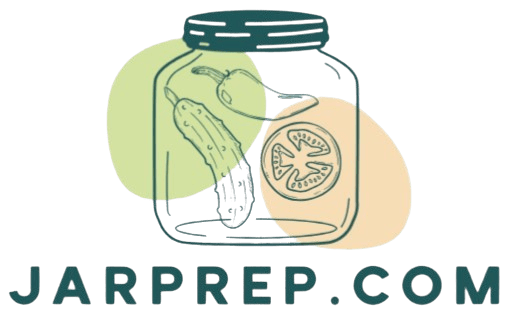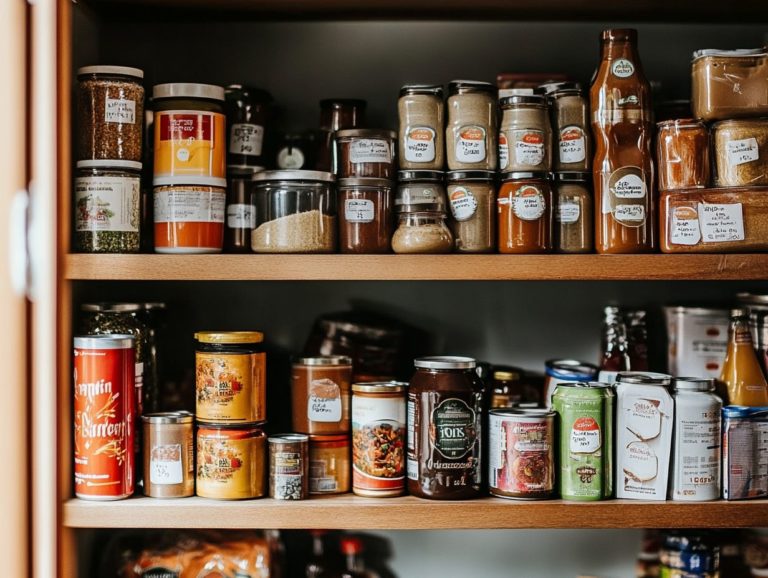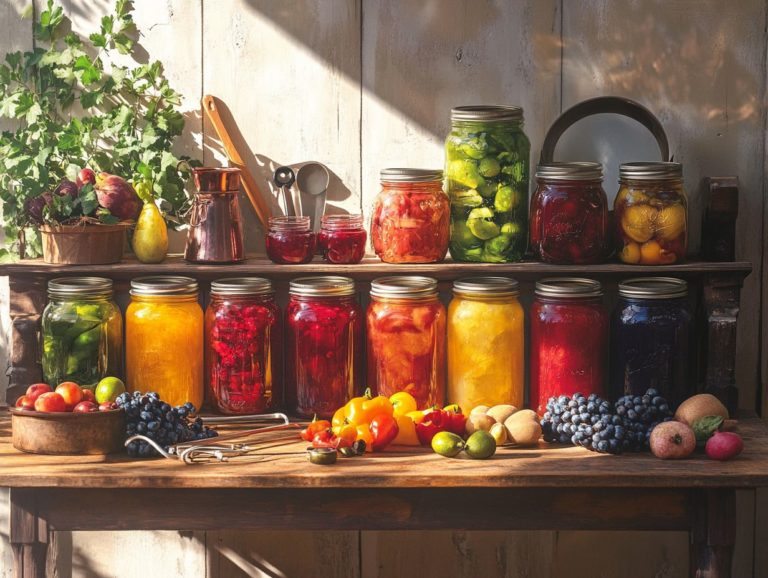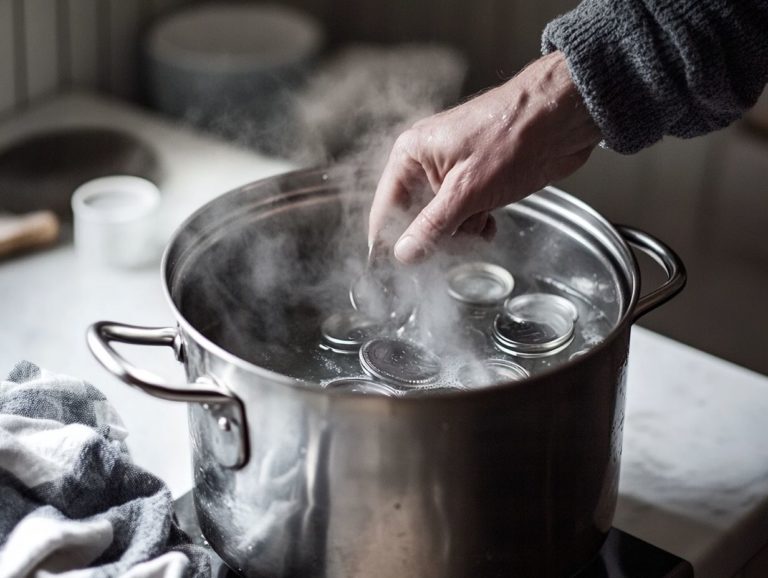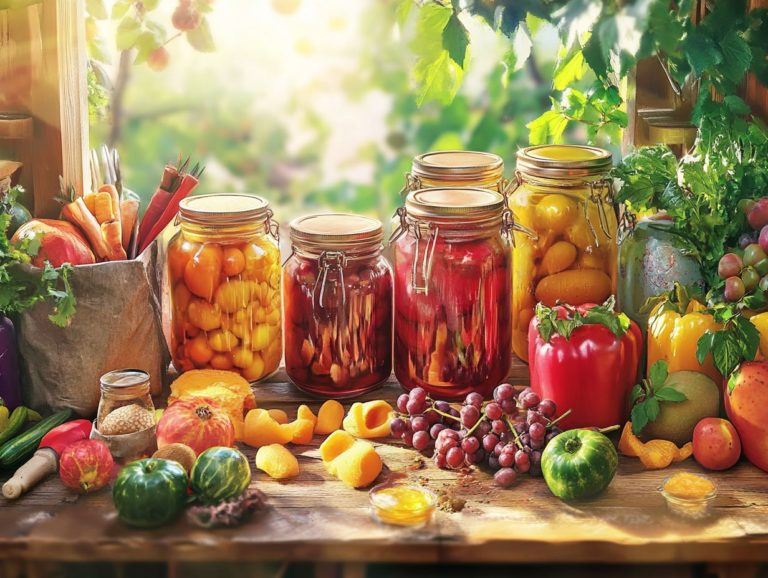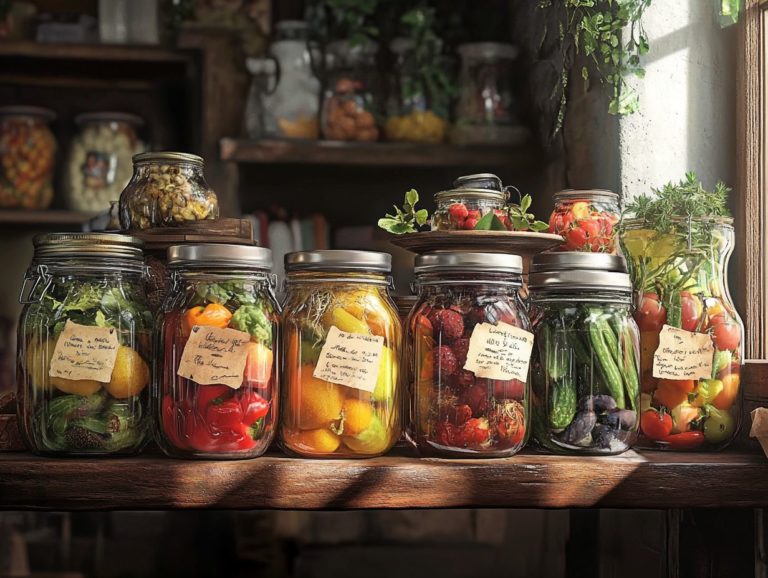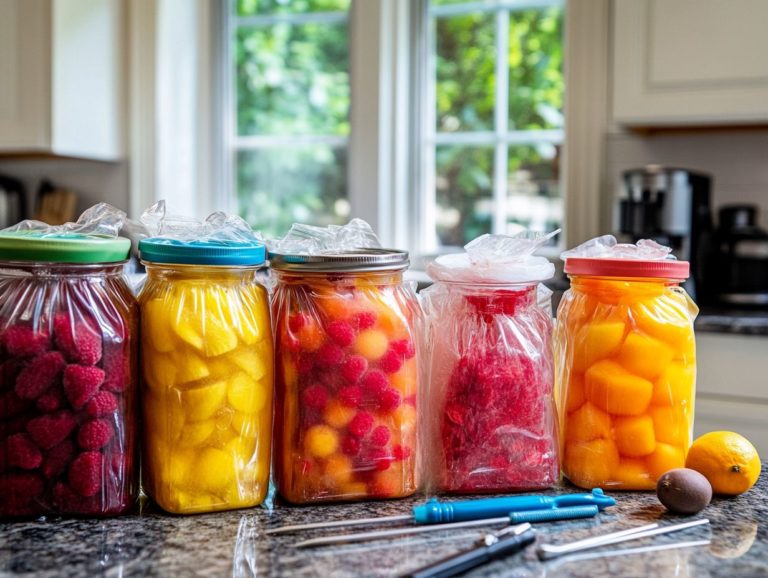Can I Can Meat at Home?
Canning meat at home is a practical skill. It s a rewarding endeavor that elevates your culinary repertoire while ensuring you always have delicious, preserved protein ready to enjoy.
This guide will walk you through the essentials of canning, including the vital techniques and equipment necessary for safe and effective preservation.
You ll discover each step of the process, from preparation to storage, while also addressing important safety concerns and shelf life. Whether you re a seasoned pro or just beginning your canning journey, this comprehensive guide arms you with the knowledge to truly master the art of canning meat.
Contents
Key Takeaways:

- Canning meat at home requires proper technique and equipment to ensure safety and shelf life.
- Preparation, sterilization, processing, and sealing are essential steps in the canning process.
- With proper storage and precautions, canned meat can have a long shelf life and be a safe food option.
Understanding the Process of Canning Meat
Canning meat is a traditional method of food preservation that involves sealing cooked or raw meat in jars and processing it under high pressure to eliminate harmful microorganisms.
This technique allows for long-term storage of various types of meat including beef, pork, and poultry and ensures the safety and quality of the preserved food.
It’s a staple approach for those who want to enjoy nutritious meals throughout the year, elevating your culinary repertoire while maximizing efficiency and flavor.
What is Canning?
Canning is an exceptional food preservation technique that involves sealing food in jars and heating them to eliminate bacteria, yeast, and molds that could otherwise spoil your food.
This process is not just effective; it s incredibly versatile, giving you the power to preserve a delightful array of foods, from vibrant fruits and crisp vegetables to savory meats and rich sauces. The jars you choose are pivotal; they should be of the highest quality and specifically designed to endure the heat of the canning process.
Properly sealing these jars is essential for creating a vacuum, which helps prevent spoilage. The importance of heating cannot be overstated; it stops natural spoilage processes and ensures that the contents remain safe to consume long after the canning process is complete. Grasping these fundamentals can truly elevate your canning experience.
The Importance of Proper Canning Techniques
Proper canning techniques are essential for ensuring that your finished product is not only safe to eat but also preserves the quality and flavor of the meat over time.
Investing your time in effective canning methods minimizes the risk of spoilage and ensures that your food is preserved properly. It’s crucial to maintain appropriate temperatures throughout the canning process, as this is key to eliminating any harmful bacteria that may be lurking. Clean jars are non-negotiable; they significantly decrease the risk of contamination.
By using the right ingredients, such as salt and broth, you not only enhance the flavor but also aid in the preservation process. Overlooking these practices could lead to serious problems, especially with harmful bacteria like Clostridium botulinum, which can thrive in improperly processed food and pose severe health risks.
Equipment and Supplies Needed for Canning Meat
To successfully can meat at home, you ll need an array of essential equipment and supplies. This includes a reliable pressure cooker or canner, jars specifically designed for canning, and high-quality ingredients such as salt and broth to elevate both flavor and preservation.
These elements are crucial for achieving the best results in your canning endeavors. Don t wait! Start your canning journey today!
Essential Tools and Ingredients

Essential tools for canning meat include a reliable pressure cooker, a selection of canning jars in various sizes, and key ingredients such as salt and broth to enhance flavor and aid in preservation.
Along with these main items, a jar lifter is essential for safely managing hot jars. You ll also need a funnel to catch any spills while filling, and a good set of tongs for handling hot meats.
Using high-quality salt can transform your meat into a delicious masterpiece! It not only elevates the flavor but also serves as a preservative, ensuring the meat remains safe for consumption.
Broth or seasoning can really elevate the overall taste profile, while proper canning lids and rings are essential for creating a vacuum seal that guarantees safe storage. Together, these tools ensure your meat retains its rich flavor and texture, all while providing the necessary safeguards during the canning process.
Steps for Safely Canning Meat at Home
Safely canning meat at home requires you to follow a series of essential steps. This includes careful preparation, thorough sterilization of your equipment, and precise processing and sealing techniques.
By adhering to these practices, you can ensure both the safety and quality of your preserved food.
Preparation and Sterilization
Preparation and sterilization are crucial steps in the canning process, and you need to pay close attention to cleaning jars and equipment. This meticulous cleaning is essential to eliminate any contaminants that could spoil your meat.
To maintain food safety standards, ensuring all tools and surfaces are sanitized is non-negotiable.
- Begin by washing your jars in hot, soapy water, or simply run them through a dishwasher on a high-heat cycle.
- After rinsing, preheat the jars by placing them in a pot of boiling water for about 10 minutes. This not only sterilizes the glass but also helps prevent breakage when you add hot contents.
- Immerse the lids in simmering water for a few minutes to ensure a proper seal.
By taking these steps, you will significantly minimize the risk of contamination, paving the way for a successful canning adventure.
Processing and Sealing
After you ve done your preparation, processing and sealing the meat in jars becomes a crucial step that demands precision with your pressure cooker and mastery of proper sealing techniques to guard against spoilage.
- Start by packing the meat into sterilized jars, making sure to leave the right amount of headspace to accommodate expansion during processing.
- Preheat your pressure cooker and add water to create that necessary steam environment.
- When the temperature hits 240 F, it s time to place the jars inside, typically processing for about 75 to 90 minutes, depending on the type of meat you re working with.
Once processing is complete, letting the pressure drop naturally is key don t rush this step for the best results! This moment helps in forming a vacuum seal. As the jars cool, listen for that satisfying pop it signals a successful seal, ensuring your meat will be safe and flavorful for months to come.
Storage and Shelf Life of Canned Meat
Grasping the nuances of storage and shelf life for canned meat is essential for preserving its quality and safety. This knowledge ensures that your preserved food remains nutritious and free from spoilage throughout its intended storage duration.
Proper Storage Techniques
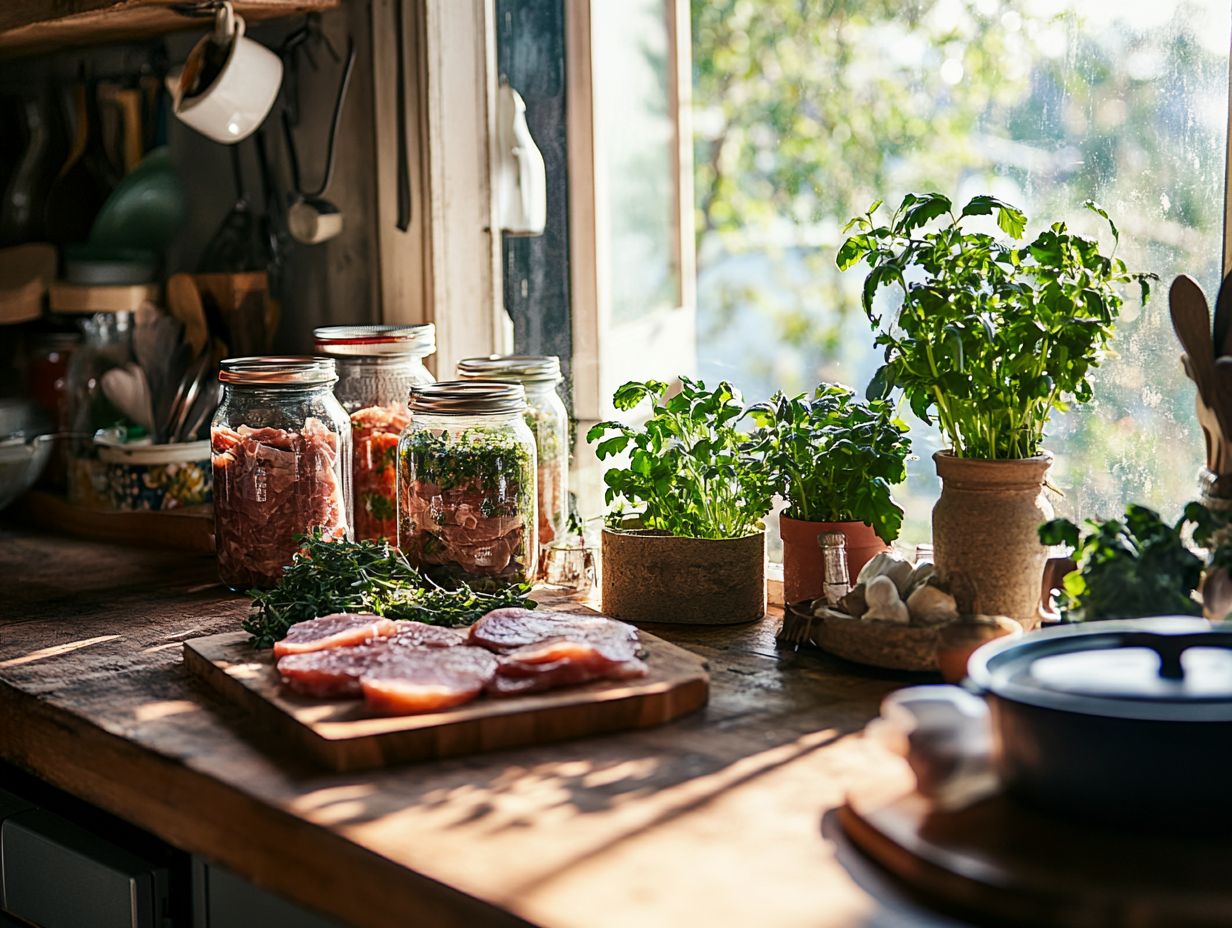
Proper storage techniques for canned meat require you to keep those jars in a cool, dark place to prevent any degradation in quality and maintain safety over time.
It s vital to maintain an ideal temperature between 50 F and 70 F, as anything higher can speed up the deterioration of your food, altering flavor, texture, and nutritional value. Humidity is also a significant factor; excess moisture can lead to rust on can lids or even invite mold, while overly dry conditions may weaken the seals.
To ensure maximum longevity, regularly check the storage environment and make necessary adjustments. This diligence guarantees that your canned meat retains its taste and safety for future enjoyment.
Start your canning adventure today and savor the flavors of your own delicious preserved meats!
How Long Can Canned Meat Last?
The shelf life of canned meat varies based on the type of meat, canning methods, and storage conditions. When properly canned and stored, this meat can last several years.
Items like canned chicken and turkey typically last two to five years, while canned beef often exceeds ten years, especially in cool, dry environments. Always check your cans for damage, rust, or dents to ensure your meat is safe and tasty!
Checking the expiration date is valuable, but remember, proper storage is key. Ideally, meat should be stored at stable, moderate temperatures to maintain its quality.
Before you dig in, take a moment to inspect the smell and appearance. This simple step helps ensure the meat is safe and palatable.
Is Canning Meat Safe?
Canning meat can be a safe and effective method of food preservation if you use the correct techniques. This minimizes the risks of spoilage and harmful microorganisms like Clostridium botulinum, keeping your food delicious and safe for consumption.
Potential Risks and Precautions
Understanding the risks of canning meat is essential for safety, especially concerning foodborne illnesses.
One significant danger is botulism, a rare but severe illness caused by a toxin from Clostridium botulinum bacteria, which thrive in low-oxygen environments like improperly canned foods. To reduce this risk, use a pressure canner instead of a water bath for low-acid foods. This ensures the internal temperature is high enough to eliminate these bacterial spores.
It s also crucial to maintain proper jar sterilization and follow recommended processing times. Regularly inspect your equipment for signs of wear or malfunction to further diminish risks, allowing you to enjoy your preserved goods with peace of mind.
Frequently Asked Questions
Can I Can Meat at Home?

Yes, you can can meat at home as long as you follow proper food safety guidelines and use the correct canning methods.
What Type of Meat Can I Can at Home?
Typically, low-acid meats like beef, pork, and poultry can be safely canned at home. Avoid canning high-acid meats such as fish and seafood.
What Equipment Do I Need to Can Meat at Home?
You will need a pressure canner, canning jars, lids, and rings. Basic kitchen tools like knives, cutting boards, and a timer are also required. It’s a good idea to have a food thermometer and a canning recipe book on hand.
Can I Use Any Canning Recipe for Canning Meat at Home?
No, it s important to use tested and approved canning recipes specifically for meat. These recipes ensure proper acidity and processing time for safe preservation.
How Long Can I Store Canned Meat?
Home-canned meat can be safely stored for up to one year in a cool, dark place. Remember to label each jar with the date and type of meat for easy tracking.
Are There Any Safety Risks to Consider When Canning Meat at Home?
Yes, following proper food safety guidelines when canning meat is crucial to prevent foodborne illness. This includes using clean equipment, adhering to processing times and methods, and properly storing the canned meat.
Get started on your canning adventure today!
